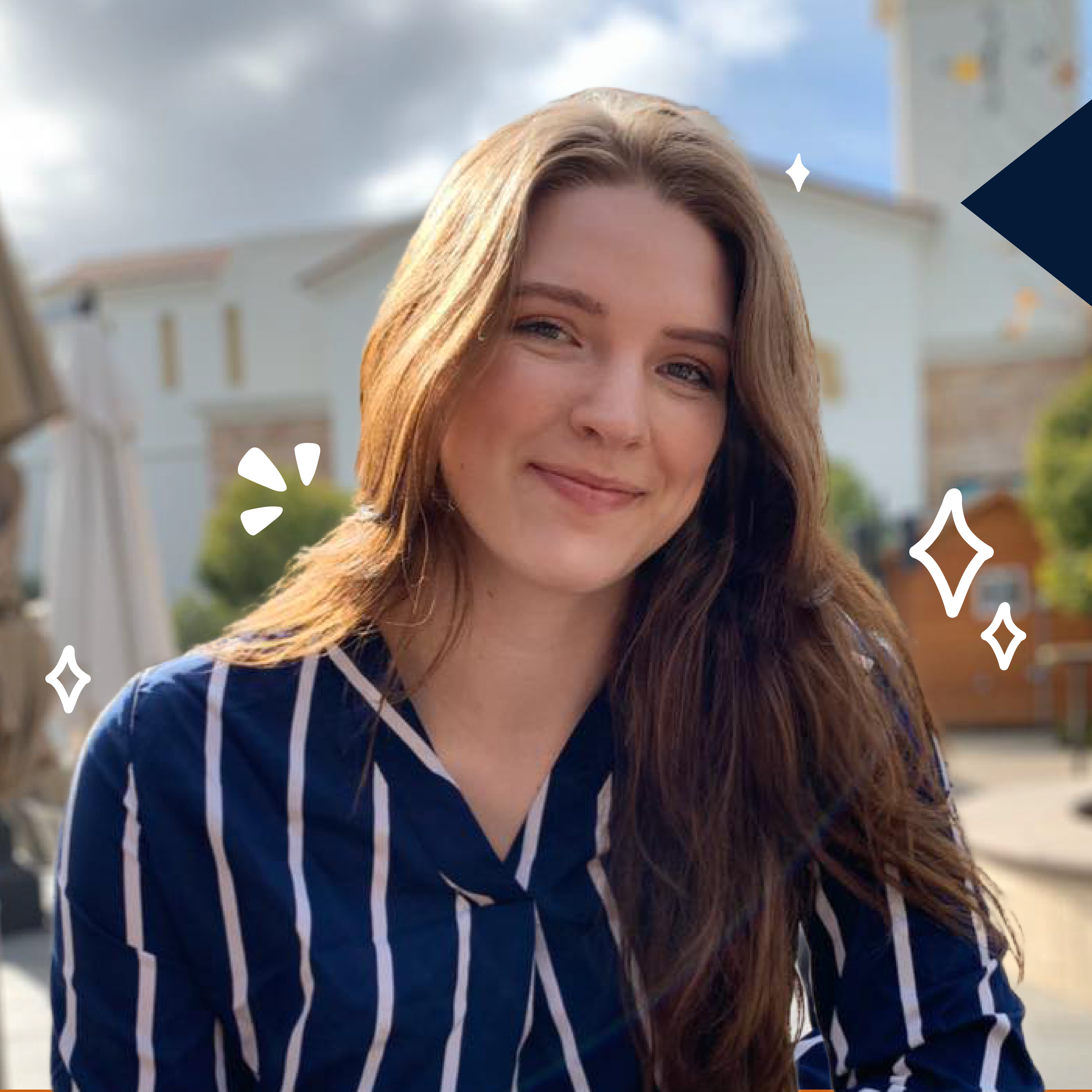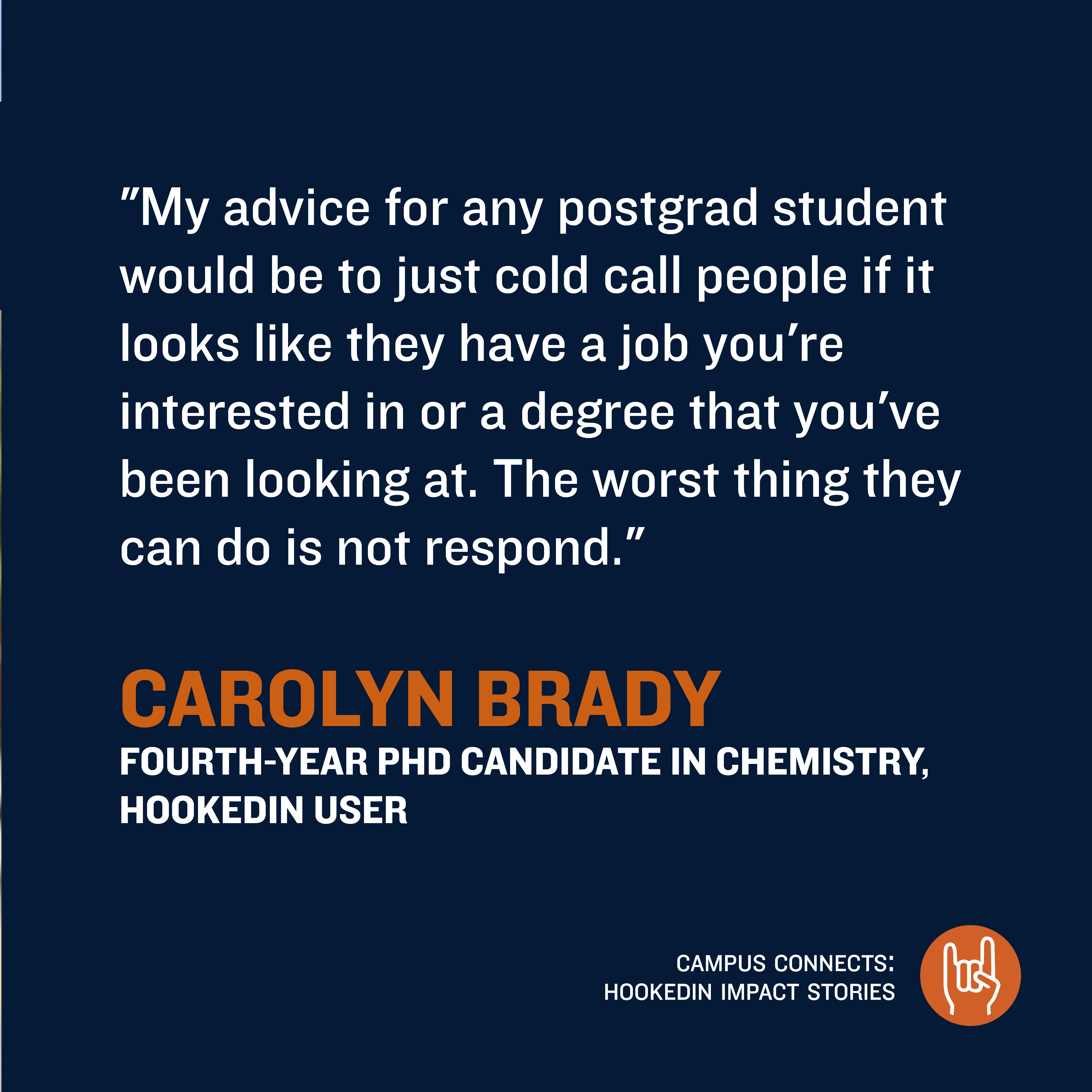HookedIn Spotlight Series: Carolyn Brady

Carolyn Brady
Fourth-year PhD candidate in Chemistry
It’s time for another edition of our HookedIn Spotlight Series! More than 20,000 Longhorns are connecting on the world’s biggest burnt-orange social network, and these Longhorns deserve the limelight. Carolyn Brady used HookedIn to find a mentor who helped her make a major decision about her academic and professional future. The Alcalde asked her to share some of the day-in-the-life details of working in her postgrad lab and how she sees herself putting her PhD to work.
Could you tell us about your educational background before coming to UT?
I was born and raised in California, which I know is a stereotype—the Californian in Texas. I started out studying geochemistry in undergrad, and then I ended up transferring to chemistry. So I got my Bachelor of Science in chemistry [at University of California, Santa Cruz, and] I did a lot of undergrad research throughout my time there.
I worked as a pharmacy tech during the pandemic, between undergrad and grad school. And then I moved to Texas in the fall of 2020 to pursue a chemistry PhD. I'm co-advised by Dr. Simon Humphrey in the chemistry department and Dr. Charlie Werth in environmental engineering because I was really interested in not only studying the impacts of humans on the environment, but also how you can mitigate and quantify that impact. I'm in my fourth year now.
What is your research focus in your PhD program?
I synthesize metallic nanoparticles, or solid metals under a hundred nanometers. We use them for catalytic purposes. The applications I'm the most interested in are environmental remediation—transforming hazardous pollutants to less hazardous byproducts that are naturally occurring.
[A project] that I've been working on for a while is looking at the methane flaring out in rural West Texas at fracking sites. The flare stacks produce methane, and the easiest way to get rid of the methane is just to burn it, but you’re producing a bunch of greenhouse gases. I'm looking at developing a material that will convert the methane to methanol, which is useful in industry and not a hazard.
To a non-scientist, that sounds like magic—like alchemy, almost.
Sounds like magic to a scientist, too!
When did you first start to think that you might want to get your PhD? What factors were you considering?
I joined a geochemistry lab one quarter into my freshman year, and I was in that lab for three and a half years. And then when I transferred from geochemistry to chemistry, I joined an inorganic materials lab at UC Santa Cruz and another at UC Davis. So I learned pretty early that I liked being able to do things with my hands. That was an easier way for me to understand how things worked than just in class.
How did you find mentors at UT?
I was part of a fellowship that also had a class component through the civil engineering department called INFEWS: Innovation at the Nexus of Food, Energy, and Water Systems. For one of the classes, we were learning about networking. They introduced us to HookedIn, and they had us practice sending a “cold call” message.
At the time I didn't know if I wanted to stay in grad school [for the full length of the PhD program] or if I wanted to get my master's and leave. So I was like, You know what, I'm just going to send this email.
Kurt Fredrickson, PhD ’15, was really receptive. We had two or three Zoom calls, and he connected me with some other resources and other people that I ended up following up with and keep in touch with still.
How did you find that professor?
I was interested in patent law—which is kind of a lot to pursue after a PhD, but a few people do it—so I used the filter feature to search the science field. I think I just searched within the College of Natural Sciences. And then I looked up law, and [Dr. Fredrickson] was the only person that came up!
He had the job that I was thinking would be a cool job to have if I didn't stay in grad school. He didn't study chemistry—he studied physics—but he had worked as a patent agent, which is still something I'm considering, and then he went to law school and is a patent lawyer now. So I messaged him using the direct message feature.
Has grad school continued to be what you expected when you decided to stay in it?
I knew that it would be very research-intensive and lab-intensive, which I expected going into it … but I don't think I realized how many other things you are doing that are not your PhD. [For example,] in the last few months I've done so many things in lab that are not chemistry—setting up things or fixing things or figuring out how to use things. I'm getting really good with power tools, and I use wrenches all the time, which is not something I expected going into class! So you're not just doing coursework or learning how to do science. You're problem solving, and you have to get creative with how you fix things, who you talk to and ask for help, and what kind of resources are available to you.
What advice would you have for others who are faced with a similar decision—whether before entering a postgrad program or at the same kind of crossroads of a master’s versus a PhD?
My advice for any postgrad student would be to just cold call people if it looks like [they have] a job you're interested in or a degree that you've been looking at or anything like that. I did it again a few months ago: I found someone who, after getting her PhD in chemistry, has a job where she connects the technical side of the team (the people who are in lab 40 hours a week) with the people who are marketing the products that they're making. She helps the marketing team make sure that they understand what the people in the lab are actually doing. I think that’s something I would enjoy doing, so I just randomly emailed her.
I do think that most people who have made it through the degree you're looking at are open to helping you because they've been through it, and they probably have benefited from other people. The worst thing that they can do is just not respond—or it’s an awkward 15-minute meeting and then life goes on.
What do you like to do when you're not in the lab?
I recently got into hot yoga.
What has been the biggest similarity between California and Texas? The biggest surprise?
I think in California there are a lot of bad drivers, and in Texas there are a lot of bad drivers, too. That's a similarity. Something I was surprised by moving to Austin was ... I love HEB. I was not expecting to find a good grocery store. In California there are so many good grocery stores, but HEB is amazing. I'll miss it if I leave Texas.
Where do you see yourself personally and professionally in 30 years?
I think the PhD gives you a lot of skills that aren't easy to describe—problem-solving and troubleshooting and critical thinking—that are harder to develop in undergrad because you're primarily in a classroom. But so much of the time now I'm just on my own, having to independently push myself. With those kind of skills, it's tricky to predict where you'll go, because they can be helpful in so many situations … But I really do think that a field I want to pursue is being the go-between for the technical side and the marketing side [of a lab]. Science communication is a strength of mine and something the field needs to work on as a whole, so I want to take advantage of that in the future.
This interview has been edited and condensed.






